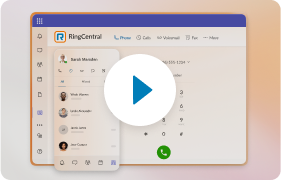A crisis can strike your business at any time without warning. When this happens, you have a small window to address concerns and protect your reputation. Establishing an online presence during a crisis can be difficult, so it’s important to have strategies in place before you actually need them.
One way to do this is through reputation management software. In this article, we’ll explore some of the different ways this tool can help you.
What is reputation management software?
Reputation management software is a powerful tool that monitors online channels for brand mentions. This includes looking at social channels, online customer reviews, and other sources to extract unique insights.
From these, organizations can take steps to improve their reputation by responding directly, altering their PR strategies, or making changes to the customer experience.
Some software provides a reputation score. This is a useful feature for benchmarking; businesses can compare how their scores stack up against competitors and monitor changes in their own score over time.
Why is reputation management useful during a crisis?
When a crisis strikes your business, it can lead to uncertainty. Customers will be concerned about how an issue might impact your ability to provide a certain product or service or how they will be personally impacted.
If your business is silent, customers can become increasingly worried. Speculation can lead to rumors that damage their trust. An effective reputation management strategy helps maintain high levels of organizational communication with customers and ease their worries.
But manual reputation management is tricky. You can’t be everywhere at once, so you’ll need to assign staff to monitor different channels and gauge customer sentiment. This takes up valuable staff power that could be used to address the crisis.
The right reputation management solution oversees this process without having to allocate additional resources. Software can provide real-time alerts so you can spot social mentions as soon as they appear.
9 Benefits of using online reputation management software
You’ve already seen how business reputation management software can help during a crisis, but that’s not the only benefit. Here are some of the main advantages:
1. Bolster customer trust
Different customers will focus on different things during a crisis. If you offer various cloud-based tools, your integration as a service (IaaS) customers will have different concerns than your storage-focused customers.
Getting to the bottom of their worries is crucial for setting the right message during a crisis.
Reputation management software enables you to understand the most common concerns of customers, giving you time to create a plan of action for addressing them. Customers are more likely to trust your business when they see you acknowledging and actively responding to their concerns.
2. Access to sentiment analysis
What if you could understand what your audience thinks of your business at all times? Online reputation management tools contain a feature called sentiment analysis. This analyzes online comments to determine whether they’re positive, negative, or neutral.
It’s a valuable tool for gauging customer opinions about your crisis response. By understanding exactly how customers are feeling, you can make data-driven decisions and tailor your messaging to align with specific emotions.
Some tools enable you to look at sentiment for certain subsections of your audience. You might discover that certain customer segments aren’t being won around by your crisis response. You can then focus on finding messaging that will land with these groups.
3. Ensure a quick response
As mentioned earlier, businesses only have a brief opportunity to respond when things go wrong. By delaying, you risk looking lax in the face of a crisis. Lack of communication from your business can lead to the spread of rumors, damaging your business’s online reputation.
With reputation management software, you’ll know as soon as customers start to express concerns online. You can respond quickly, counter misinformation, and control how the topic is spoken about.
Countering disinformation early also puts less pressure on your staff. They’ll spend less time having to address online complaints and can focus on crisis response.
4. Leverage valuable data analytics
During a crisis, it’s critical to have a complete overview of your strategy. You should be able to answer questions such as:
- How many people are my communications reaching?
- How many users are engaging with my communications?
- Are people responding favorably to my messaging?
Answering these questions becomes much easier with the right insights. Luckily, online reputation management tools equip you with data analytics features.
You can find information relating to reach, engagement, and other insights about your post. You can then use visual or narrative reporting to convey this information to your response team, changing course as needed.
5. Increase audience visibility
Remember, your response won’t only be visible during the period of a crisis. It’ll stay online for future potential customers to see.
When people search for your brand in the future, they’ll find records of your communications. If they see clear and transparent dialogue with your audience, they’re more likely to look favorably on your brand. A mishandled response will have the opposite effect.
Reputation management software helps you find the right message and tone in your communications. You’ll create favorable audience interactions that will stand as a record of your effective customer service. Customers will feel more confident that, if a future crisis does arise, you’ll deal with it effectively.
6. Contributes to a positive SERP ranking
Securing a high position on the search engine results page (SERP) can be a tricky process. But did you know search engines like Google give priority to credible brands with happy audiences?
Crisis communication can have a huge impact on how your brand is perceived. The right strategy can even improve your brand reputation. Lack of communication, on the other hand, can damage your reputation and impact your SERP ranking.
Crisis communication software equips you with the tools to respond effectively to crises, protect your brand’s reputation, and secure its position at the top of search results.
7. Respond to negative reviews effectively
When your product doesn’t deliver, you’ll likely receive customer feedback voicing your audience’s frustrations. A crisis can begin to develop when large numbers of customers are posting bad reviews.
You can’t stop consumers from leaving unfavorable online reviews. You can, however, demonstrate that your brand is listening by actively responding to online feedback.
That said, keeping up-to-date with review sites can be difficult. This is where reputation management software comes in.
The right solution will collate customer reviews so you can provide instant review responses, no matter the platform they’re posted on. This lets you scale down the number of staff required to focus on review responses, freeing them up to start resolving the crisis instead.
8. Helps ensure compliance
Sometimes, a crisis can also have legal implications. For instance, to ensure GLBA compliance, you must have an incident response plan in place. What is GLBA compliance?’ It’s a regulation that governs how financial institutions should store customers’ financial information.
Other legislation, such as GDPR, requires organizations to inform customers about a data breach within a certain window.
Online reputation management tools can help you respond quickly and appropriately. You make sure your messaging is reaching your audience and that they’re properly informed about your crisis response.
9. Improved post-crisis planning
The work shouldn’t end once a crisis has abated. Even the best crisis response strategies have room for improvement. It’s important to learn lessons about your response.
How did you achieve business continuity? What could have been handled more effectively? Could you use AI customer service tools to take the pressure off your team while still communicating effectively, or did your customer respond better to the personal touch?
By taking note of these points, you can ensure a more successful response to future crises.
The right reputation management tool can give you actionable insights into your crisis communication strategy. You can see where messaging landed with your audience, as well as areas where a different approach was needed.
This way, you can ensure you don’t repeat the same mistakes again.
Reputation management software is a game-changer
No matter how much preparation you do, there’s always a potential crisis around the corner. When a crisis does strike, communication will be essential. The right strategy sends a clear message to customers and eases their concerns.
Above all, it helps guarantee that your brand’s reputation emerges intact when the crisis concludes.
This is why reputation management software can be a game changer. Through features such as sentiment analysis, data analytics, and response management, you can create and deliver an effective crisis communications plan.
FAQs
What is reputation management software?
Reputation management software monitors online sources, such as social media and review sites, to find brand mentions. Some solutions provide a reputation score to gauge how your business is viewed by its audience.
Does my business need reputation management software?
Reputation management software helps you spot discontent in your audience. You can ensure your messaging is resonating with your audience. During a crisis, you can identify audience concerns and address them.
Updated Jul 20, 2025












